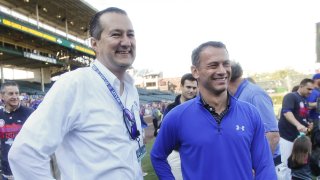
How looming labor conflict influences Cubs extension talks originally appeared on NBC Sports Chicago
Cubs president Jed Hoyer is smart for not making Anthony Rizzo an extension offer anything close to what the 31-year-old first baseman wants?
Rizzo’s right to feel insulted by the lowball offer and cut off talks?
Tom Ricketts and his siblings should sack up and act like billionaire owners of a big-market team and keep the good players from what might be a three-star exodus to free agency this year?
Feeling out of the loop? We'll catch you up on the Chicago news you need to know. Sign up for the weekly Chicago Catch-Up newsletter here.
Whatever side of this lovelorn triangle you fall on, the extension-talk sagas of all three Cubs core stars — including Javy Baez and Kris Bryant — probably couldn’t be playing out at a worse time for most involved.
The players face possible free agency during an economically skittish time for many industries during the persistent pandemic, just as four years of growing discontent over suspicious free agent markets and other industry business practices threaten a labor war ahead of December’s expiration of the collective bargaining agreement.
A slashed payroll budget and front-office layoffs heading into another season of uncertainty this year only adds to the scrutiny and pressure on Hoyer as he assumes the top spot from Theo Epstein, who got out while the getting was good — leaving Hoyer’s name on the championship-core exodus and next, almost certainly tougher rebuild.
Meanwhile, ownership has been exposed during the pandemic for prioritizing land-grabs, development, capital growth and, consequently, over-extended debt over team-building — at the possible expense of requiring another cost-conscious rebuild for the sport’s fourth-highest-valued franchise, which also charges the highest ticket prices in the game.
If anybody sympathized with Ricketts’ assertion of “biblical losses” last year, picture what’s at stake for everybody in this scenario just five years after they all celebrated in the rare air at the top of the baseball world in Cleveland.
As labor talks loom alongside the Cubs timelines of Bryant, Baez and Rizzo, the clubhouse’s resident expert on labor issues — player rep Ian Happ — mulled such things as how the Cubs and their World Series core reached this point without extensions for any of the big three.
“That’s a good question,” Happ said during a recent conversation with NBC Sports Chicago. “Extensions are difficult because players bet on themselves, players believe in themselves; they see numbers in free agency of guys that they’re comparable to, and they want to be compensated as such.
“It’s difficult in our system to go out and extend three or four guys who are All-Star/MVP-caliber players and do it in a way that makes the player feel valued. As a player, all you want in playing for a team that you love and a city you love is to feel like the organization values you and thinks you’re worth what you do.”
Team officials say they’re optimistic an extension with Rizzo will get done, even as Rizzo reiterated Tuesday that he doesn’t see a reason to listen to offers. Baez said Monday he envisions still being a Cub next year, despite no apparent offer on the table. And even Bryant’s agent had very general extension talks this spring with the club for the first time in four years.
But while some teams have used the economic downturn to acquire and extend desired players to lock in extended roster strength, the Cubs have taken a different approach.
It’s an approach that meant shipping out Cy Young runner-up Yu Darvish and the final three years of his contract in a salary-dump trade and that has meant 18 of 26 players on the active roster entering the season in walk-years.
It also has meant just three players under guaranteed contracts next year for a total of $38.5 million — the greatest payroll flexibility the front office has had in at least 15 years.
But against the backdrop of impending labor conflict over issues that in many cases have been defined by the Cubs’ business practices — tanking, service-time manipulation, etc. — there seems little correlation to that flexibility and any decisions to get aggressive with contract extensions.
Listen Wednesday's episode of the Cubs Talk Podcast with Happ to hear some of his thoughts on how to solve some of those issues in labor negotiations — how to incentivize winning and maybe even resolve some of the service-time issues by redefining club control by age, and/or allowing younger players to access vehicles to bigger paydays sooner than the system allows now.
“I think both sides should be conscious first of the health of the game, of being stewards of the game, of leaving it better than we found it,” Happ said, “and not necessarily about short-term profits.”
But here’s the thing: Nobody knows what comes next in the next labor battle — never mind whose ideas win which days.
And for the free agents and clubs trying to navigate the uncertain terrain in their best interests?
For now, neither side seems especially confident they’ll avoid a labor stoppage that could be disastrous for everybody in the game.
“That’s always part of bargaining,” Happ said. “That’s always something that is a possibility.
“I think both sides need to look at the long-term success and health of baseball. They have to understand it’s more than one side or the other side winning and both sides coming together to fairly compensate players for their contribution to their team — and understanding that the more we can grow the game, the better it is for both sides.”
Meanwhile, in Chicago, the only place this team has come together — from ownership to the front office to the core players — is at a crossroads, staring at competing interests with no one willing to make the next move. Much less a big one.




